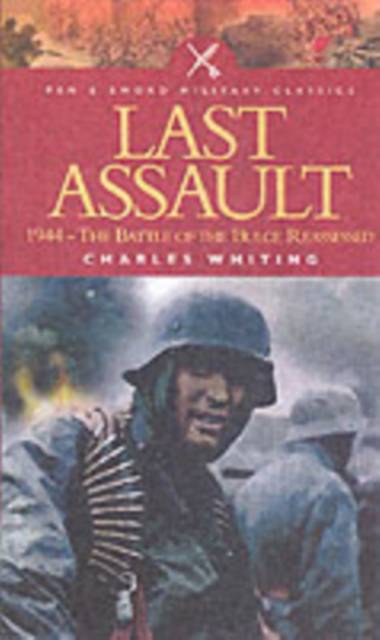
- Afhalen na 1 uur in een winkel met voorraad
- Gratis thuislevering in België vanaf € 30
- Ruim aanbod met 7 miljoen producten
- Afhalen na 1 uur in een winkel met voorraad
- Gratis thuislevering in België vanaf € 30
- Ruim aanbod met 7 miljoen producten
Zoeken
€ 11,45
+ 22 punten
Omschrijving
It has generally been assumed by historians of the Second World War that the Americans were caught completely unawares by the last great German Offensive - the drive into the Ardenees in December, 1944, known as the Battle of the Bulge.
But were they in fact caught unawares? In this remarkable reappraisal of those hectic days which preceded the last Christmas of the War, Charles Whiting argues that the answer is very probably that they were not. Which immediately poses the question: 'if the Americans knew that the Germans were coming, why didn't they reinforce the troops on the weakly held Ardennes sector of the front line?' Why indeed!
What is certain is that ever since the end if the Second World War the guardians of the files relating to the Battle of the Bulge in the United States have been most unwilling to permit any examination thereof - this is spite of the Freedom of Information Act. So the author raises yet another question: 'Was somebody trying to cover something up and if so why?'
On the basis of such information as he has been able to cull from those, as yet unsorted, files and on information provided by the numerous survivors of the battle with whom he has been in contact, Charles Whiting attempts to answer these questions, and in so doing suggests that, if and when all the information relating to the Battle of the Bulge is made available, a serious reappraisal of that brief but bloody campaign, in which thousands of young American soldiers lost their lives at a time when many regarded the war as virtually won, may be required.
But were they in fact caught unawares? In this remarkable reappraisal of those hectic days which preceded the last Christmas of the War, Charles Whiting argues that the answer is very probably that they were not. Which immediately poses the question: 'if the Americans knew that the Germans were coming, why didn't they reinforce the troops on the weakly held Ardennes sector of the front line?' Why indeed!
What is certain is that ever since the end if the Second World War the guardians of the files relating to the Battle of the Bulge in the United States have been most unwilling to permit any examination thereof - this is spite of the Freedom of Information Act. So the author raises yet another question: 'Was somebody trying to cover something up and if so why?'
On the basis of such information as he has been able to cull from those, as yet unsorted, files and on information provided by the numerous survivors of the battle with whom he has been in contact, Charles Whiting attempts to answer these questions, and in so doing suggests that, if and when all the information relating to the Battle of the Bulge is made available, a serious reappraisal of that brief but bloody campaign, in which thousands of young American soldiers lost their lives at a time when many regarded the war as virtually won, may be required.
Specificaties
Betrokkenen
- Auteur(s):
- Uitgeverij:
Inhoud
- Aantal bladzijden:
- 256
- Taal:
- Engels
Eigenschappen
- Productcode (EAN):
- 9781844152223
- Verschijningsdatum:
- 1/04/2005
- Uitvoering:
- Paperback
- Formaat:
- Trade paperback (VS)
- Afmetingen:
- 130 mm x 199 mm
- Gewicht:
- 290 g

Alleen bij Standaard Boekhandel
+ 22 punten op je klantenkaart van Standaard Boekhandel
Beoordelingen
We publiceren alleen reviews die voldoen aan de voorwaarden voor reviews. Bekijk onze voorwaarden voor reviews.








